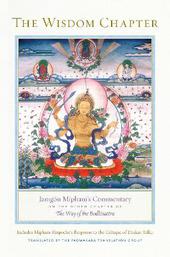
|
The Wisdom Chapter: Jamgoen Mipham's Commentary on the Ninth Chapter of The Way of the Bodhisattva
Hardback
Main Details
Description
The first English translation of Mipham Rinpoche's commentary on the "wisdom" chapter of Shantideva's classic text, in which Mipham explains Madhyamaka philosophy from the perspective of the Dzogchen tradition of Tibetan Buddhism. The Way of the Bodhisattva is one of the most important texts in the Tibetan tradition, a core guide beloved by all the schools, which takes the reader through the training in the Bodhisattva path. The ninth chapter, however, is regarded as difficult because it deals with Madhyamaka, the Middle Way, the most profound wisdom view of Mahayana Buddhism. Mipham Rinpoche's commentary is an exposition and defense of the interpretation of the ninth chapter according to the Older Tradition (Nyingma, Sakya, and Kagyu) of Tibetan Buddhism. Mipham explains how the view presented by Shantideva is in fact the view of Dzogchen. It stirred up a furious debate in Tibet because it took issue with the interpretation by the New Tradition (Gelugpa) that was religiously and politically dominant at that time. That debate is captured beautifully here as this volume includes a critique of Mipham Rinpoche's view by a prominent Gelugpa tulku as well as Mipham's response.
Author Biography
JAMG N MIPHAM (1846-1912) displayed a universal genius as he wrote on all aspects of Buddhist theory and practice, as well as on the traditional sciences. He is one of the most influential figures to come out of the Tibetan tradition in recent centuries. SHANTIDEVA (eighth century) was a Buddhist scholar and contemplative who was a member of the monastic Nalanda university, which was one of the most celebrated centers of learning in ancient India. The PADMAKARA TRANSLATION GROUP, based in France, has a distinguished reputation for all its translations of Tibetan texts and teachings. Its work has been published in several languages and is renowned for its clear and accurate literary style.
Reviews"Shantideva's 'Wisdom Chapter' essentializes the Madhyamika teachings. With reasoning that precisely elucidates all of Nagarjuna's subtle points, this single chapter has provided a doorway to the Middle Way teachings for many great masters, including Jamgoen Mipham Rinpoche, author of the Ketaka Jewel. Mipham's commentary and his subsequent debate with Drakar Tulku of the Riwo Gadenpa school show us the potential of deep debate. This dialogue about the nature of phenomena between two of the preeminent scholars and meditation masters of the nineteenth century has moved and inspired many, including myself. I hope this translation serves in the same manner that their original discussion has, ever since it came into being. I am delighted to see that Wulstan Fletcher and the Padmakara Translation Group have accomplished such a great feat, and dedicate the merit of their undertaking to the blossoming of prajna in all beings."-Dzigar Kongtrul, author of The Intelligent Heart "It is important to understand that the Buddha never taught because of his knowledge but always through his compassion-according to the needs of his hearers. That's why he didn't really mean what he said in some teachings and did really mean it in others. That distinction is very important, because Shantideva's ninth chapter is a commentary on what the Buddha really meant! It's also most important to understand that the reasoning Buddhists use to investigate ultimate truth cannot be used to examine relative truth. And yet, unconsciously, we always do that-which creates the huge pitfall of underestimating relative truth and exaggerating ultimate truth, or the reverse. If you truly want to understand this, then read Shantideva's ninth chapter again and again. In fact, never stop reading it. To that end, Mipham Rinpoche's commentary is like a magnifying glass and telescope combined-for those who are farsighted and nearsighted." -Dzongsar Jamyamg Khyentse, author of The Guru Drinks Bourbon? "The Padmakara Translation Group has made yet another major contribution to Buddhist scholarship with this compilation of beautiful and accessible translations of important Tibetan Buddhist texts. The Wisdom Chapter presents a major debate that has been going on for centuries on the nature of ultimate truth, and a debate with continued relevance for living Buddhist traditions in the contemporary world. The introduction and translations here guide the reader through the dynamic and complex world of Buddhist commentarial tradition as it charts the contours of two major lines of interpretation of Madhyamaka in Tibet."-Douglas S. Duckworth, author of Jamgoen Mipam: His Life and Teachings
|